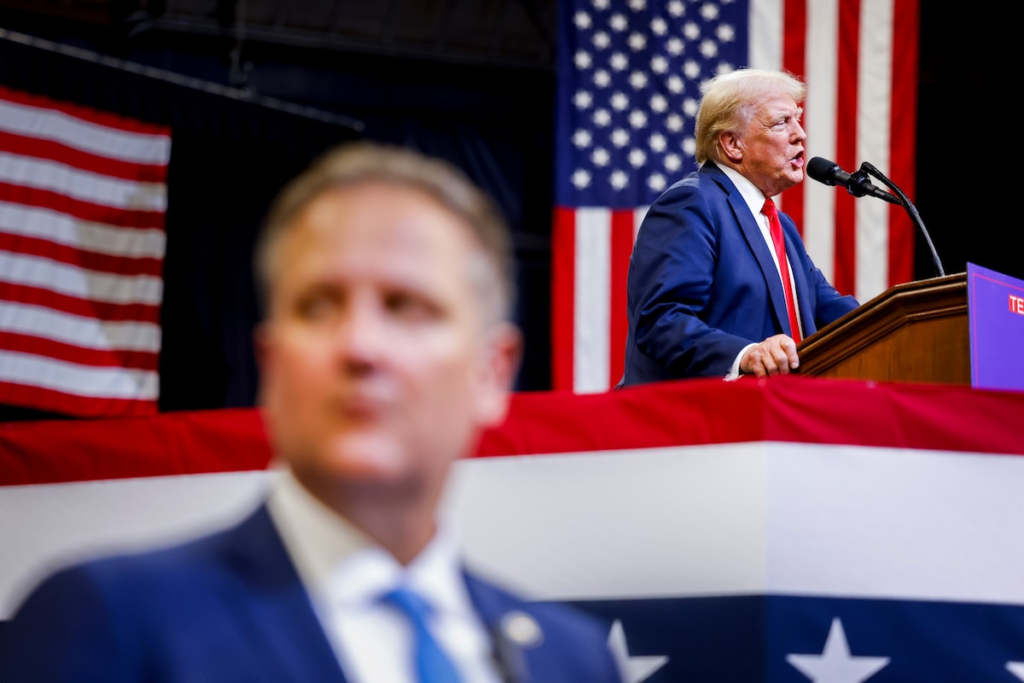On Saturday, Donald Trump’s presidential campaign announced that it had been the target of a foreign hacking operation. This revelation followed inquiries from various news organizations regarding a detailed vetting document about vice-presidential nominee Sen. JD Vance (R-Ohio) that had been leaked to the press.
Table of Contents

[Republican presidential nominee Donald Trump speaks at a rally in Bozeman, Mont., on Friday. (Michael Ciaglo/Getty Images)
Foreign Interference Allegations
Steven Cheung, a spokesperson for the Trump campaign, issued a statement alleging that the documents in question were obtained through illegal means from foreign entities hostile to the United States. According to Cheung, these actions were designed to interfere with the 2024 presidential election and to create confusion within the democratic process.
The statement followed a report published by Microsoft on Friday. The tech giant revealed that Iranian hackers had attempted to infiltrate the email account of a high-ranking official associated with a U.S. presidential campaign in June. While Microsoft did not publicly disclose the identity of the targeted campaign, sources familiar with the situation confirmed that it referred to the Trump campaign.
Lack of Concrete Evidence
Cheung did not provide evidence to support the claim that Iranian hackers were behind the document leak nor did he disclose whether the campaign had been in touch with Microsoft. However, he noted that the timing of the incident aligned with Trump’s selection of Vance as his running mate.
Sources familiar with the matter indicated that the campaign had independently determined its email system was compromised earlier this summer. Despite this, the campaign did not disclose the breach publicly or to law enforcement at the time. Officials were instructed to enhance their email security, but the campaign remained uncertain about the identity of the hackers. These details were revealed under the condition of anonymity due to the sensitivity of the issue.

Republican presidential nominee Donald Trump
Document Leak Details
Politico reported on Saturday that it had been contacted by an anonymous source on July 22, who provided proprietary information about the Trump campaign, including the vetting document for Vance. The Washington Post also received a 271-page document about Vance, dated February 23 and marked “privileged & confidential,” from a sender using an AOL email account. This document, which highlighted potential political vulnerabilities of the first-term senator, was verified as authentic by two individuals familiar with its contents. The document was reportedly commissioned by the Trump campaign from Brand Woodward, a law firm involved with several Trump advisers.
The anonymous sender did not respond to phone calls but indicated the possession of additional sensitive information, including internal campaign emails and documents related to Trump’s legal cases.
Microsoft’s Findings
On Friday, Microsoft disclosed that a group affiliated with Iran’s Islamic Revolutionary Guard Corps had compromised the email account of a former adviser to a U.S. presidential campaign. The compromised account was used in June to contact a senior official still involved in the campaign. The email included a link to a site potentially allowing Iranian operatives to intercept other emails from the target. Microsoft declined to comment on whether the attack had been successful.
Government and Security Responses
The National Security Council spokesperson condemned any foreign government or entity attempting to interfere with the U.S. electoral process or undermine democratic institutions. The FBI acknowledged awareness of the media reports but refrained from commenting further. Iran’s permanent mission to the United Nations did not respond to requests for comment.
U.S. intelligence officials had previously warned in July that Iran was working to exacerbate societal discord in the U.S. and undermine Trump’s efforts to regain the presidency, mirroring Iranian actions in the 2020 election.

Republican presidential nominee Donald Trump
Previous Allegations and Historical Context
Last month, New York prosecutors charged a Pakistani man with ties to Iran in connection with a murder-for-hire plot targeting a U.S. politician or government official. This plot, allegedly backed by Iran, raised concerns about Trump’s safety in the lead-up to the attempted assassination in July.
Cheung’s statement referenced these concerns, asserting that the Iranians were aware that Trump would counteract their influence as he did during his first term. He criticized media outlets for disseminating documents and internal communications that, according to him, served the interests of America’s adversaries.
Historical Comparison
Cheung’s statements marked a notable shift from the 2016 campaign, when Trump publicly praised WikiLeaks for releasing Democratic emails suspected to have been hacked by Russia. Trump’s favorable remarks about WikiLeaks contrasted sharply with his current condemnation of the unauthorized release of campaign documents.
Expert Analysis
Thomas Rid, a professor of strategic studies at Johns Hopkins University, described hacks and leaks like those alleged by the Trump campaign as the “white whale” of foreign influence operations. These operations are characterized by potentially impactful, deceptive materials that may include forgeries among genuine leaks. Rid noted that while such operations are highly anticipated, it was unclear if this incident fit that description.
Contributors to this report include Devlin Barrett, Joseph Menn, Aaron Schaffer, Chris Dehghanpoor, Sam Oakford, and Toluse Olorunnipa.
You may also read this recent News